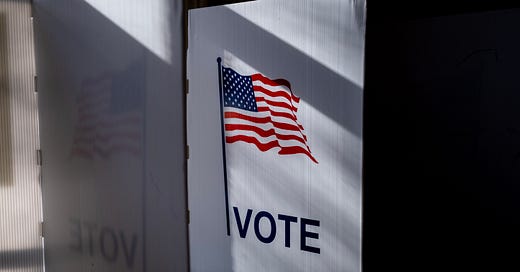
A New Threat to the Voting Rights Act
A federal court says citizens cannot challenge racial gerrymanders through the VRA.

LAST WEEK, A FEDERAL APPEALS COURT ruled in a 2-1 decision that there is no private cause of action under Section 2 of the Voting Rights Act of 1965 (VRA). What this means is that only the Department of Justice—and not voters and other groups—can sue to challenge electoral maps that are gerrymandered to the disadvantage of racial minorities. Because most Section 2 cases are brought by private plaintiffs and not DOJ, the ruling, if left to stand, will make it much harder for courts in the seven states of the Eighth Circuit—Arkansas, Iowa, Minnesota, Missouri, Nebraska, North Dakota, and South Dakota—to enforce what’s left of the VRA.
Let’s start with some background: The VRA, originally enacted in 1965 and amended several times in the following decades, is a landmark piece of legislation aimed at countering racial discrimination in voting. It outright banned abhorrent practices like literacy tests, and includes two key provisions for weeding out more subtle race-based constraints on ballot access. Section 2, as now codified, prohibits state and local governments from imposing any voting rule that “results in a denial or abridgement of the right of any citizen of the United States to vote on account of race or color” or membership in a language minority group. Section 2 has largely been used to challenge gerrymandering, the legislative carving up of voting district boundaries every ten years, following the census. State legislatures tend to draw lines that favor the party in control, essentially consolidating into certain districts voters who are loyal to the party while breaking up into separate districts blocs of voters from the opposing party.
Another section of the VRA, Section 5, required certain states—those with a record of voter suppression—to obtain “preclearance” from DOJ before implementing election practices and procedures that could be discriminatory. But a decade ago, in Shelby County v. Holder, the U.S. Supreme Court struck down the formula for deciding which states had to go through preclearance, effectively gutting Section 5. As a result, there’s been more pressure on Section 2 to do the work of both provisions. In a case called Brnovich v. Democratic National Committee, a 6-3 Supreme Court majority added multiple legal hurdles to bringing a Section 2 case—hurdles that do not exist in the statute itself. And in Rucho v. Common Cause, the Court altogether banned lawsuits challenging partisan gerrymandering (but not racial gerrymandering), holding that, even if illegal, they present political questions beyond the proper reach of the federal courts.
The very existence of these Section 2 cases underscores why the Eighth Circuit ruling is so perplexing. In his majority opinion in Brnovich, decided just two years ago, Justice Samuel Alito took for granted that the Democratic National Committee was a proper plaintiff to bring that lawsuit. The same went for Allen v. Milligan, an opinion that came down in June of this year, in which a group of plaintiffs led by Alabama legislator Bobby Singleton brought a Section 2 lawsuit challenging Alabama’s gerrymandered map following the 2020 census—and won in the Supreme Court. There are many more such cases brought by private plaintiffs, including one pending in the Supreme Court this term involving a South Carolina map.
So in its ruling last week, the Eighth Circuit is basically telling the Supreme Court that it’s all wrong—that it erroneously addressed the merits in all of these Section 2 cases when it should instead have rejected the cases because they were brought by parties other than DOJ, and Congress authorized only DOJ to bring such cases.
The Eighth Circuit ruling didn’t quite come out of nowhere. In Brnovich, Justice Neil Gorsuch wrote a concurring opinion to “flag one thing” that the majority did not decide: whether Section 2 “furnishes an implied cause of action.” Gorsuch’s flag formed the basis for an argument that later persuaded the Eighth Circuit—that is, that Congress didn’t “simply say” that a private right of action is available to allow private parties to enforce Section 2, so it isn’t.
Bear in mind, however, that the Supreme Court has construed other acts of Congress as implying private rights of action in the past. Although the practice of implying rights of action from legislation has been increasingly frowned upon, the Court is also somewhat constrained by precedent—including decades of cases recognizing an implied right of action under Section 2. Moreover, it often looks to the fact that Congress has been complacent with such precedent as evidence that Congress is perfectly happy with private plaintiffs suing under Section 2. After all, Congress didn’t ban private rights of action when it amended the VRA in 1970, 1975, 1982, 1992, and 2006—which it did to shore up protections for voting rights, including after the Supreme Court improperly raised the bar to bringing cases.
One could argue that the statute’s vagueness is determinative, and unless Congress amends the VRA text, the task now falls to DOJ to fill the void that will be left by the rejection of private challenges in the seven states covered by the Eighth Circuit. Alas, as opponents of voting rights understand, that solution is a no go: Despite voting for Section 5’s renewal multiple times in the past, including by a 98-0 Senate vote in 2006, Republicans have consistently killed Democratic attempts to respond to the Supreme Court’s instructions in Shelby County, leaving states with more leeway to play games when it comes to the precious right to vote.
















